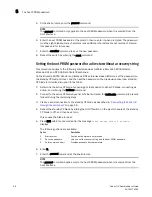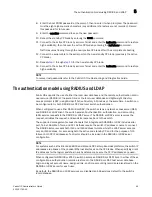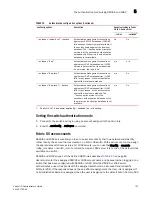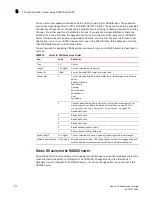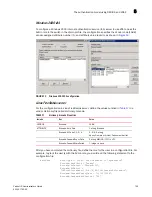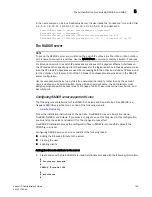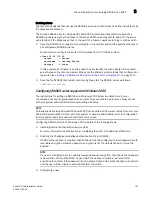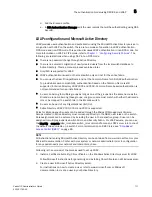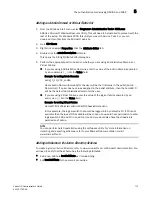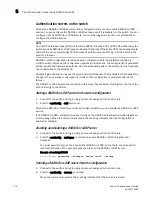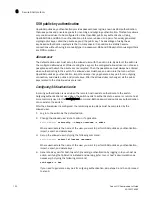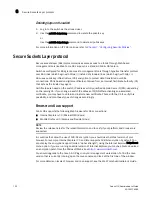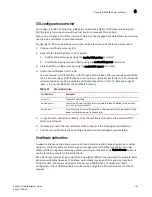
Fabric OS Administrator’s Guide
111
53-1001763-02
The authentication model using RADIUS and LDAP
5
d. Add the Brocade profile.
e. In RSA Authentication Manager, edit the user records that will be authenticating using RSA
SecurID.
LDAP configuration and Microsoft Active Directory
LDAP provides user authentication and authorization using the Microsoft Active Directory service in
conjunction with LDAP on the switch. There are two modes of operation in LDAP authentication,
FIPS mode and non-FIPS mode. This section discusses LDAP authentication in non-FIPS mode. For
more information on LDAP in FIPS mode, refer to
Chapter 7, “Configuring Security Policies”
. The
following are restrictions when using LDAP in non-FIPS mode:
•
There is no password change through Active Directory.
•
There is no automatic migration of newly created users from the local switch database to
Active Directory. This is a manual process explained later.
•
Only IPv4 is supported for LDAP.
•
LDAP authentication is used on the local switch only and not for the entire fabric.
•
You can use the User-Principal-Name and not the Common-Name for AD LDAP authentication.
To provide backward compatibility, authentication based on the Common Name is still
supported for Active Directory LDAP 2000 and 2003. Common Name based-authentication is
not recommended for new installations.
•
A user can belong to multiple groups as long as one of the groups has the same name as the
Brocade role name. Among those groups, one group name must match with either the Brocade
role or be mapped to a switch role in the Brocade switch.
•
A user can be part of any Organizational Unit (OU).
•
Active Directory LDAP 2000, 2003, and 2003 is supported.
Roles for Brocade-specific users can be added through the Microsoft Management Console.
Groups created in Active Directory must correspond directly to the RBAC user roles on the switch.
Role assignments can be achieved by including the user in the respective group. A user can be
assigned to multiple groups like Switch Admin and Security Admin. For LDAP servers, you can use
the ldapCfg
-–
maprole
ldap_role name switch_role
command to map an LDAP server role to one of
the default roles available on a switch. For more information on RBAC roles, see
“Role-Based
Access Control (RBAC)”
on page 84.
NOTE
All instructions involving Microsoft Active Directory can be obtained from www.microsoft.com or your
Microsoft documentation. Confer with your system or network administrator prior to configuration
for any special needs your network environment may have.
Following is the overview of the process used to set up LDAP:
1. Install a Certificate Authority (CA) certificate on the Windows Active Directory server for LDAP.
Follow Microsoft instructions for generating and installing CA certificates on a Windows server.
2. Create a user in Microsoft Active Directory server.
For instructions on how to create a user, refer to www.microsoft.com or Microsoft
documentation to create a user in your Active Directory.
Summary of Contents for 53-1001763-02
Page 1: ...53 1001763 02 13 September 2010 Fabric OS Administrator s Guide Supporting Fabric OS v6 4 0 ...
Page 4: ...iv Fabric OS Administrator s Guide 53 1001763 02 ...
Page 24: ...xxiv Fabric OS Administrator s Guide 53 1001763 02 ...
Page 28: ...xxviii Fabric OS Administrator s Guide 53 1001763 02 ...
Page 32: ...xxxii Fabric OS Administrator s Guide 53 1001763 02 ...
Page 40: ...xl Fabric OS Administrator s Guide 53 1001763 02 ...
Page 42: ...2 Fabric OS Administrator s Guide 53 1001763 02 ...
Page 54: ...14 Fabric OS Administrator s Guide 53 1001763 02 High availability of daemon processes 1 ...
Page 74: ...34 Fabric OS Administrator s Guide 53 1001763 02 Basic connections 2 ...
Page 102: ...62 Fabric OS Administrator s Guide 53 1001763 02 Audit log configuration 3 ...
Page 214: ...174 Fabric OS Administrator s Guide 53 1001763 02 Management interface security 7 ...
Page 228: ...188 Fabric OS Administrator s Guide 53 1001763 02 Brocade configuration form 8 ...
Page 276: ...236 Fabric OS Administrator s Guide 53 1001763 02 Creating a logical fabric using XISLs 10 ...
Page 404: ...364 Fabric OS Administrator s Guide 53 1001763 02 ...
Page 440: ...400 Fabric OS Administrator s Guide 53 1001763 02 Performance data collection 17 ...
Page 480: ...440 Fabric OS Administrator s Guide 53 1001763 02 F_Port masterless trunking 19 ...
Page 494: ...454 Fabric OS Administrator s Guide 53 1001763 02 Buffer credit recovery 20 ...
Page 574: ...534 Fabric OS Administrator s Guide 53 1001763 02 Hexadecimal overview E ...


